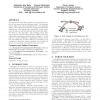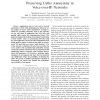206 search results - page 31 / 42 » Inferring privacy policies for social networking services |
ICSOC
2010
Springer
13 years 5 months ago
2010
Springer
In Service-Oriented Computing (SOC), fragmentation and merging of workflows are motivated by a number of concerns, among which we can cite design issues, performance, and privacy. ...
SIGCOMM
2009
ACM
14 years 2 months ago
2009
ACM
For most mobile networks, providers need the current position of their users to provide efficient service. The resulting motion data is not only an invaluable source for analyzing...
SP
2008
IEEE
14 years 2 months ago
2008
IEEE
— Applications such as VoIP need to provide anonymity to clients while maintaining low latency to satisfy quality of service (QoS) requirements. Existing solutions for providing ...
SOUPS
2009
ACM
14 years 2 months ago
2009
ACM
Feedback is viewed as an essential element of ubiquitous computing systems in the HCI literature for helping people manage their privacy. However, the success of online social net...
INFOCOM
2000
IEEE
13 years 11 months ago
2000
IEEE
Abstract--The advent of electronic commerce and personal communications on the Internet heightens concerns over the lack of privacy and security. Network services providing a wide ...



